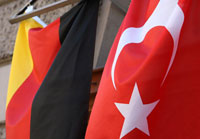Germany Harbors Anger and Hostility against Turkey?
German Chancellor Angela Merkel arrived in Turkey on March 29 for a two-day visit. She held a meeting with Turkish Prime Minister Recep Tayyip Erdogan to discuss various issues – from global problems to the situation with the Turkish community in Germany.

Germany and Turkey have a number of discrepancies in their relations. The biggest one of them is about Germany’s opposition to Turkey’s full membership in the European Union. Merkel said that the talks about the EU membership for Turkey was a process with no end date. She added that Germany could offer Turkey the status of a privileged partner of the European Union, rather than a member.
Erdogan does not share Merkel’s point of view.
“It would be a big mistake. We continue the talks on the full membership only,” he said.
Egemen Bagis , Turkey ’s minister for European affairs, said that such a status as privileged partnership does not exist.
"So we do not take that option seriously because there is no legal foundation of it. At times I feel insulted for being offered something which does not exist," he added.
The two countries disagree on their approach to the Iranian issue. Merkel said that the international community must put more pressure on Iran over its intention to continue the uranium enrichment program. Erdogan did not support such measures.
The German Chancellor also urged Turkey to officially recognize the government of Cyprus, which holds the EU membership. Ankara only recognizes the Turkish Republic of Northern Cyprus and does not intend to revise its stance on the matter.
The discussion about the situation with the three-million-strong Turkish community in Germany developed into a hot argument. The Turkish government wants Germany to open Turkish schools in the country. Germany was not enthusiastic about such an idea, to put it mildly.
German officials said last week that the appearance of Turkish schools in Germany would impede the integration of Turkish nationals into the German society.
Turkey ’s Prime Minister Erdogan stated prior to Merkel’s visit to Ankara that he could not understand the reasons for such hostility against Turkey.
“I was not expecting that from Chancellor Merkel. Is Turkey a whipping boy for Germany?” he said.
Erdogan said that Germany could introduce dual German-Turkish citizenship so that the Turks living in Germany could preserve their ethnic citizenship.
Merkel considerably changed her views regarding the opening of Turkish schools in Germany during her talks with Tayyip Erdogan.
“Since Germany has its schools in other countries, it is quite natural for Turkey to have its schools in Germany,” she said.
One shall assume that Merkel agreed. However, she added that children of Turkish origin would have to study German.
The educational dispute is connected with the first problem, which the two leaders discussed in Ankara – Turkey’s membership in the European Union. Europe does not really welcome the idea to grant the EU membership to such a large Muslim state as Turkey with its 70-million-strong population.
“The mosques are our barracks, the domes our helmets, the minarets our bayonets and the faithful our soldiers,” Erdogan once said. Turkey’s pro-Islamic prime minister repeatedly urged the Turkish Germans not to assimilate in the German society and continue living under traditional Muslim and national rules.
Many Germany-based Turks are not religious at all. About a quarter of the three-million-strong community does not go to mosques. The rest live under Islamic Sharia laws.
There were only three mosques in Germany 40 years ago. Now there are over 2,500 of them in the country. Berlin’s Kreuzberg has been dubbed as Istanbul for its Oriental appearance.
German police regularly report about the exposure of Islamite terrorist organizations. German citizens protest the construction of mosques and minarets in the country. It is not ruled out that Germany may follow the example of Switzerland and ban the construction of minarets.
The French government does not agree upon the opening of Arab schools in France, claiming that such schools may become a hotbed of Islamic extremism. Germany has similar concerns.
It seems that Merkel has agreed to open Turkish schools in Germany. However, it does not mean that the schools will be opened. Germany still wants to delay Turkey’s membership in the European Union indefinitely.
Vadim Trukhachev
Pravda.Ru
Russia Today: Turkey warns US over Armenian genocide resolution
Subscribe to Pravda.Ru Telegram channel, Facebook, RSS!




